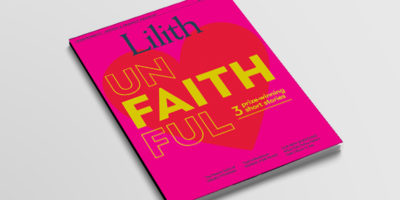Are You a Woman Who Survived Concentration Camp? Or Her Daughter or Granddaughter?
Peggy Kleinplatz , a professor in the Faculty of Medicine at the University of Ottawa, asks Lilith’s help in reaching female Holocaust survivors who underwent injections or a substance administered in their food in concentration camp, after which they did not menstruate.
We are eager to document the forced administration to women of substances that led to the cessation of their menstruation and, for some, infertility and miscarriages afterward.
In the years after the Shoah, the common and understandable medical assumption was that the cessation of menstruation in the camps was the result of malnutrition. But there is now data to refute this: both the emaciated women arriving to Auschwitz in 1944 from Poland’s ghettos and the women arriving in 1944 from Hungary, where they were not starved, all stopped menstruating immediately after arrival, regardless of differences in body mass.
Some women reportedly received injections, others were forced to ingest food or liquids which contained a similar substance. In both cases the women ceased menstruating—some for months, some for years; some suffered miscarriages or were left permanently infertile. Self-reports suggest that the younger the adolescent girl at the time she arrived in the concentration camps, the greater the long-term impact upon her future reproduction.
These interventions were conducted so routinely that this history has been unspoken and its connection to long-term effects unrecognized. Interviews with survivors indicate that they were part of the “processing” of those new female arrivals at Auschwitz (and perhaps other death camps) who were not killed immediately. Women survivors’ experience related to their subsequent fertility may also have received limited investigation because of the sensitive and taboo subject. Survivors themselves may have been reluctant to raise the issue, and earlier interviewers may not have thought to—or had the training to—ask questions that would elicit such material.
To uncover these missing stories, one of my colleagues and I are seeking to interview female concentration camp survivors and any children of survivors whose mothers may have shared with them stories about their post-Holocaust fertility challenges. While there is no cohesive, documented narrative of this particular experience, stories exist vividly in the memories of survivors who still do not know what exactly was done to them or why. We are attempting to assemble the fragments of this unknown chapter of the Shoah and to hear from women and their children. We can conduct interviews in Yiddish, English, Hebrew or French. Not only do these women’s stories deserve to be given voice, but also there may be important medical consequences for the second and third generation.
To be interviewed, contact Peggy J. Kleinplatz, Ph.D. at 613-563-0846 or Paul J. Weindling, Ph.D. at pjweindling@menbrookes.ac.uk.


